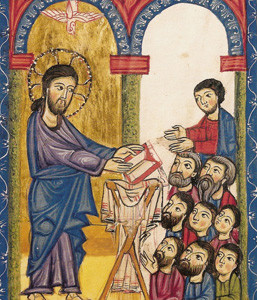Thoughts on Today’s Lessons for Jan. 24, 2016

Jesus teaching in the synagogue.
Why would something like “the Law” inspire people to rejoice or weep? “Torah,” the Hebrew word used here, has come down to us as “Law” in translation through Greek to English. But “Torah” originally meant “teaching” or “instruction.” In that context, when we see the people of Jerusalem hearing Torah read in the public square, it is a holy moment, and the people weep when they recognize that they had forgotten and failed to follow God’s teaching.
Today’s Psalm sings the praises of Torah, not as harsh legislation but nurturing teaching that inspires us. A hymn of worship and praise, this Psalm first celebrates God’s glory and creation, then rejoices in the Torah. God’s teaching revives our souls, turns our innocence into wisdom, makes our hearts leap up and our eyes sparkle. We gain enlightenment from God’s teaching; in following its precepts there is great reward.
Second Reading: 1 Corinthians 12:12-31a
Last week, in the verses just before these, we heard Paul declare that every member of the church receives different spiritual gifts. Now Paul continues this theme with a striking metaphor: He likens the church to Christ’s body in the world. Every member of the church – like every bodily part – plays a different but important role. The foot, the ear, the hand, the eye: Each has its role, each is critical to the body’s operation, and all are important. Just as this is true for the body, so it is for the church.
Gospel: Luke 4:14-21
Jesus’ public ministry has begun. Driven by the Spirit that came down at the time of his baptism, he has been tested in the desert, preached and taught in Galilee, and now he returns to the synagogue in his childhood home, Nazareth. Unrolling the Torah scroll to the Prophet Isaiah, he reads verses that will define his mission, ideas that echo his mother’s song and God’s covenant with the people at Sinai. This scripture is fulfilled in him, he declares. He has come to bring good news to the poor and the oppressed, and to declare the year of Jubilee in which slaves are freed and debts are forgiven.
